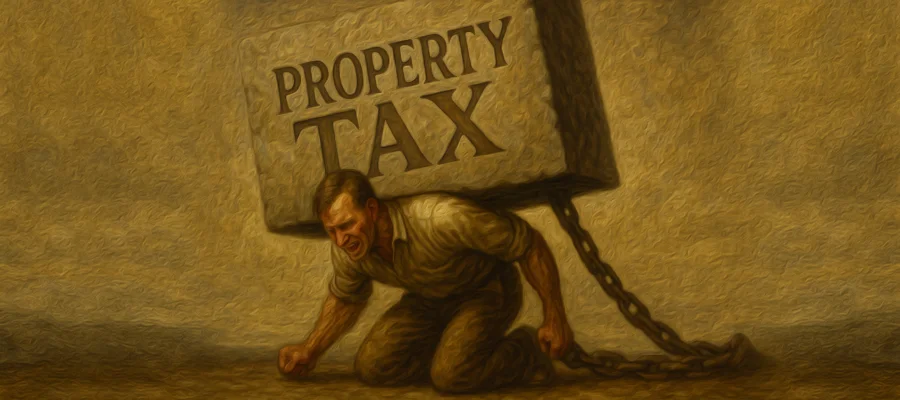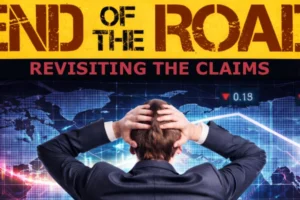The Insidious Unconstitutionality of Property Tax
Property tax has become a seemingly unquestioned fixture of American life, but I would argue that its legitimacy deserves serious scrutiny. Beyond the practical burdens it imposes, the property tax is fundamentally incompatible with the Founders’ vision of liberty and private ownership. It represents an ongoing intrusion of government into individual rights and a departure from constitutional principles. Hence, it makes those who perpetuate and defend it a potential enemy of the Constitution itself. However, to understand why property tax is not only economically harmful but also unconstitutional in spirit, we need to examine the history of property rights, the Founders’ intent, and the nature of taxation itself.
“The price good men pay for indifference to public affairs is to be ruled by evil men.”
Plato
Property Tax as Perpetual Rent
Property tax undermines the very concept of ownership. A person who pays for land or a home outright never truly owns it if the state reserves the power to confiscate that property for failure to pay taxes. This transforms ownership into a form of perpetual tenancy. The so-called “owner” is, in reality, renting property from the government, and the tax bill functions as annual rent due. Such a system erodes the security of property rights, leaving every individual vulnerable to displacement regardless of how responsibly they acquired or maintained their property. This is a fundamental problem regarding the whole “Life, liberty, and the pursuit of property” idea.
Founders’ Intent and Constitutional Principles
The Framers of the Constitution considered property rights to be a cornerstone of liberty. In fact, James Madison wrote in 1792 that “Government is instituted to protect property of every sort… This being the end of government, that alone is a just government, which impartially secures to every man, whatever is his own.” To Madison and his contemporaries, secure property rights were inextricably linked to freedom.
Yes, the Constitution grants Congress limited powers of taxation, specifically duties, imposts, excises, and direct taxes apportioned among the states according to population (Article I, Sections 2 and 9). However, property taxes imposed by state and local governments were not part of the federal framework and were understood to be temporary or narrowly applied measures, rather than perpetual mechanisms of revenue. The Founders were deeply suspicious of taxes that could reduce ownership to conditional possession, because such taxes directly echoed the feudal systems of Europe that America sought to leave behind. I’m not entirely sure why this is so hard to understand.
The Insidious Nature of Property Taxation
I should also point out that property tax is not some neutral funding mechanism. Instead, it’s an invasive tool of control. Unlike sales or income taxes, which are linked to voluntary exchanges or productive activity, property tax penalizes stability. In this scheme, simply retaining what one has already earned and paid for becomes taxable. This creates several insidious effects:
- Erosion of Security: Citizens live with the knowledge that their property can be seized for unpaid taxes, creating a state of insecurity even among the diligent.
- Disproportionate Impact: The tax disproportionately harms elderly and low-income families, who often live on fixed incomes, which is a significant problem when government irresponsibility results in the erosion of the dollar’s value. Frankly, these people are punished not for new consumption or productivity, but for simply existing in a home they already own. Moreover, it doesn’t tax those who choose not to own or cannot afford to own property.
- Perpetuation of Dependency: Property tax provides governments with a semi-guaranteed, renewable revenue stream, which actually incentivizes perpetual extraction from citizens rather than fiscal responsibility.
The Founders’ intent was the opposite. They envisioned government as a servant, not a landlord. The property tax reverses that relationship, and this is especially true when considering how the government will likely show up with a gun to evict property owners if they do not comply.
Alternatives to Property Taxation
It is often argued that property taxes are necessary because the government must have reliable revenue. Perhaps, but it could also be argued that the government shouldn’t be so big and wasteful, and here we are. Nonetheless, such arguments also confuse funding with profit.
I’ll just be blunt and say that the government was never meant to profit from the people, nor was it intended to undermine stability or seize what has already been earned. The role of taxation is to cover the limited and enumerated expenses of government, not to sustain perpetual growth or to enrich the state at the expense of its citizens. Frankly, we encounter a similar problem with income taxes, but that’s a topic for a different article.
That said, alternatives do exist. For example, we could explore something similar to H.R. 25, often referred to as the “FairTax,” which proposes replacing income taxes with a national, consumption-based tax. While imperfect, this kind of approach is far more consistent with voluntary exchange. It taxes transactions rather than stability and ownership. More importantly, it avoids the structural injustice of property tax, where families can lose what they already own simply because they cannot pay a recurring bill (rent).
Historically, the federal government relied on tariffs and excises to fund operations. These mechanisms aligned more closely with the constitutional design, ensuring that the government did not derive its revenue from holding property rights hostage. Now, whatever approach is taken, the principle must remain clear: taxation should never strip individuals of secure ownership, nor should government revenue be engineered to grow at the expense of liberty.
Unconstitutionality in Practice
Federalists and turncoats may argue that the Supreme Court has upheld property taxation as a matter of state power. Fine, but Marbury v. Madison made clear that “all laws which are repugnant to the Constitution are void.” By that standard, property tax cannot stand when examined through the lens of the Founders’ writings and intent.
And when you really think about it, the Constitution explicitly protects against uncompensated takings of property (Fifth Amendment) and secures that rights not delegated to the federal government are reserved to the people (Tenth Amendment). Moreover, we have to admit that ownership that is conditional upon perpetual rent payments is not ownership at all. The essence of property rights is permanence, and property tax strips that permanence away by transforming possession into conditional tenure. This inversion of ownership not only undermines constitutional guarantees but also places citizens in a perpetual state of dependency on the government or direct opposition.
And let’s be honest, the current system of property taxation bears a striking resemblance to the very tyranny the American Revolution was fought to escape. Colonial resistance to British taxation rested on the principle that taxes without proper consent were instruments of oppression. Today, property tax regimes perpetuate this injustice, stripping property from citizens who fail to pay, even in the absence of debt, crime, or contract violation. Frankly, it should piss everyone off.
Final Thoughts
I suppose my point is that property tax is more than a financial burden; it is a structural violation of liberty. If the people can’t figure this out, it will never be rectified. Either way, it redefines ownership into conditional possession, contradicts the Founders’ intent to secure property as an unassailable right, and mirrors the systems of control America was founded to reject.
If we are serious about moving toward some kind of constitutional fidelity, then a serious reconsideration of property taxation is necessary. On that note, I’ll close by saying that funding mechanisms must respect true ownership and the foundational principle that government exists to protect property, not to hold it hostage. If the government can’t exist at its current size without exploiting its own people, then that’s probably a clue that it is vastly too big.
Keep Reading:
– Uncomfortable Truths About Taxation
– Changing the Institution of Tax




